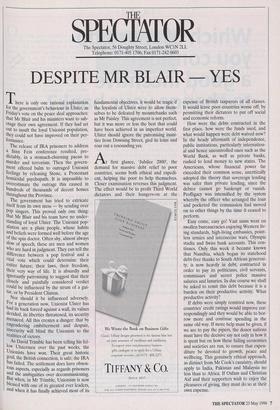IHk SPECTATOR
The Spectator, 56 Doughty Street, London WC1N 2LL Telephone: 0171-405 1706; Fax 0171-242 0603
DESPITE MR BLAIR YES
There is only one rational explanation for the government's behaviour in Ulster, as Friday's vote on the peace deal approaches: that Mr Blair and his ministers want to sab- otage their own agreement. If they had set out to insult the loyal Unionist population, they could not have improved on their per- formance.
The release of IRA prisoners to address a Sinn Fein conference resulted, pre- dictably, in a stomach-churning paean to murder and terrorism. Then the govern- ment offered balm to outraged Unionist feelings by releasing Stone, a Protestant homicidal psychopath. It is impossible to overestimate the outrage this caused in hundreds of thousands of decent homes throughout the Province.
The government has tried to extricate itself from its own mess — by sending over Pop singers. This proved only one thing: that Mr Blair and his team have no under- standing of loyal Ulster. The Unionist pop- ulation are a plain people, whose habits and beliefs were formed well before the age of the spin doctor. Often shy, almost always slow of speech, these are men and women who are hard in judgment. They can tell the difference between a pop festival and a vital vote which could determine their entire future; their laws, their freedom, their very way of life. It is absurdly and ignorantly patronising to suggest that their Closely and painfully considered verdict could be influenced by the strum of a gui- tar, or by President Clinton. Nor should it be influenced adversely. For a generation now, Unionist Ulster has had its back forced against a wall, its values derided, its liberties threatened, its security menaced. All this creates a danger: that by engendering embitterment and despair, insecurity will blind the Unionists to the realities of victory. As David Trimble has been telling his fel- low Ulstermen over the past weeks, the Unionists have won. Their great historic goal, the British connection, is safe; the IRA has failed. The settlement does have obnox- ious aspects, especially as regards prisoners and the ambiguities over decommissioning. But when, in Mr Trimble, Unionism is now blessed with one of its greatest ever leaders, and when it has finally achieved most of its fundamental objectives, it would be tragic if the loyalists of Ulster were to allow them- selves to be defeated by mountebanks such as Mr Paisley. This agreement is not perfect, but it was more or less the best that could have been achieved in an imperfect world. Ulster should ignore the patronising inani- ties from Downing Street, gird its loins and roar out a resounding yes.
Afirst glance, 'Jubilee 2000', the demand for massive debt relief to poor countries, seems both ethical and expedi- ent, helping the poor to help themselves. Closer examination reverses this judgment. The effect would be to profit Third World dictators and their hangers-on at the expense of British taxpayers of all classes. It would leave poor countries worse off, by permitting their dictators to put off social and economic reform.
How were the debts contracted in the first place, how were the funds used, and what would happen were debt waived now? In the heady aftermath of independence, public institutions, particularly internation- al and hence uncontrolled ones such as the World Bank, as well as private banks, rushed to lend money to new states. The Americans, whose financial power far exceeded their common sense, uncritically adopted the theory that sovereign lending was safer than private lending, since the debtor cannot go bankrupt or vanish. Profligacy was intensified by the system whereby the officer who arranged the loan and pocketed the commission had moved on to other things by the time it ceased to perform.
Easy come, easy go! Vast sums went on swollen bureaucracies enjoying Western liv- ing standards, high-living embassies, point- less armies and internecine wars, Olympic stadia and Swiss bank accounts. This con- tinues. Only this week it became known that Namibia, which began its statehood debt-free thanks to South African generosi- ty, is now heavily in debt, contracted in order to pay its politicians, civil servants, commissars and secret police massive salaries and luxuries. In due course we shall be asked to remit this debt because it is a burden on their productive activity. What productive activity?
If debts were simply remitted now, these countries' credit ratings would improve cor- respondingly and they would be able to bor- row more and continue spending in the same old way. If more help must be given, if we are to pay the pipers, the donor nations must have the decisive say not only in how it is spent but on how these failing economies and societies are run, to ensure that expen- diture be devoted to growth, peace and wellbeing. This genuinely ethical approach, as distinct from Mr Cook's casuistry, should apply to India, Pakistan and Malaysia no less than to Africa. If Oxfam and Christian Aid and their supporters wish to enjoy the pleasures of giving, they must do so at their own expense.


































































 Previous page
Previous page